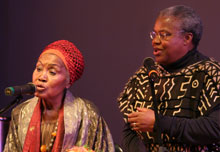
Dr. Bernice Johnson Reagon and Odetta performing at Montgomery County Community College on Saturday December 2, 2006
(adapted from liner notes to her last CD “Gonna Let It Shine: A Concert for the Holidays”, MC Records)
I heard Odetta sing for the first time in 1962 at the Morehouse College Gym on the corner of Ashby and West Fair Streets in Atlanta GA. I was taken to the concert by historian Howard Zinn, his wife Roz and their children who said it was a folk music concert. I was a student at Spelman College because I had received a scholarship to continue my studies after being suspended from Albany State College because I had participated in demonstrations that resulted in mass arrests in my home town of Albany Ga.
On that Sunday afternoon, when Odetta came out on stage with her guitar, I knew this was going to be different. She had a powerful presence and was at the same time gentle, she looked beautiful and young, and her hair was cut short and natural. When she began to sing, I could not believe what I was hearing! I was thunderstruck!
You go to Memphis, don’t you mess around
You go to Memphis, don’t you mess around
You go to Memphis, don’t you mess around
Police catch you and you’re workhouse bound
Workhouse bound Lordy, workhouse bound
She was singing a chain gang song and slapping her guitar to keep time and she was a women and she did not hold back. She threw her sound into that room so that we could stand in the feeling not just of her voice, but the feeling of the chain gang. When she began to sing Joshua Fit de Battle of Jericho, a door opened in my mind. I thought, “Oh this is a folksong too? The songs I grew up singing in Southwest Georgia are folksongs?”
That I did not have to go learn folksongs, I already knew them, they were the songs I had grown up with in church, in school, on the playground… in that concert—I was changed. Odetta reached back a path to me and others looking for straddling ways to find our own way of creating.
Odetta was more than a performing artist for us. The sixties was a wonderful powerful time to come into your own as a young activist. There were a few artists we leaned on because their music sang what we were trying to hack out of this land of our birth. Odetta was one of those who changed the cultural air we had to breathe. A dear friend of mine who was in one of the early classes of African American students integrating the University of North Carolina to this day says that the singing of Odetta and Nina Simone kept her sane as she completed her undergraduate work in a culture that was not yet welcoming to her development or her future. And that in her dorm room their album covers helped to create a physical cultural force that helped her to survive.
As a musician, Odetta is a pioneer. There were others who brought African American songs and singing to the concert stage before she began her work. However, there was no one who came close to ploughing a new road blending her training as a musician and bending and expanding it to the new repertoire she chose to bring to a larger public. She had the voice for it. Her range was wide, her capacity for shifting vocal textures was off the charts. She used all of her voice in her song storytelling—sweet, high, soft, shifting to out front clarion shout that made everyone know it was Odetta singing; and then again back to a softer, sometimes humorous twisting—and all with passion and all with celebrating and sharing so much more than the songs, but bringing her audiences closer to a story that is uniquely American and promising.
And then, she sang all the way in over and through, I hear her singing even now in the air around me… Odetta…
